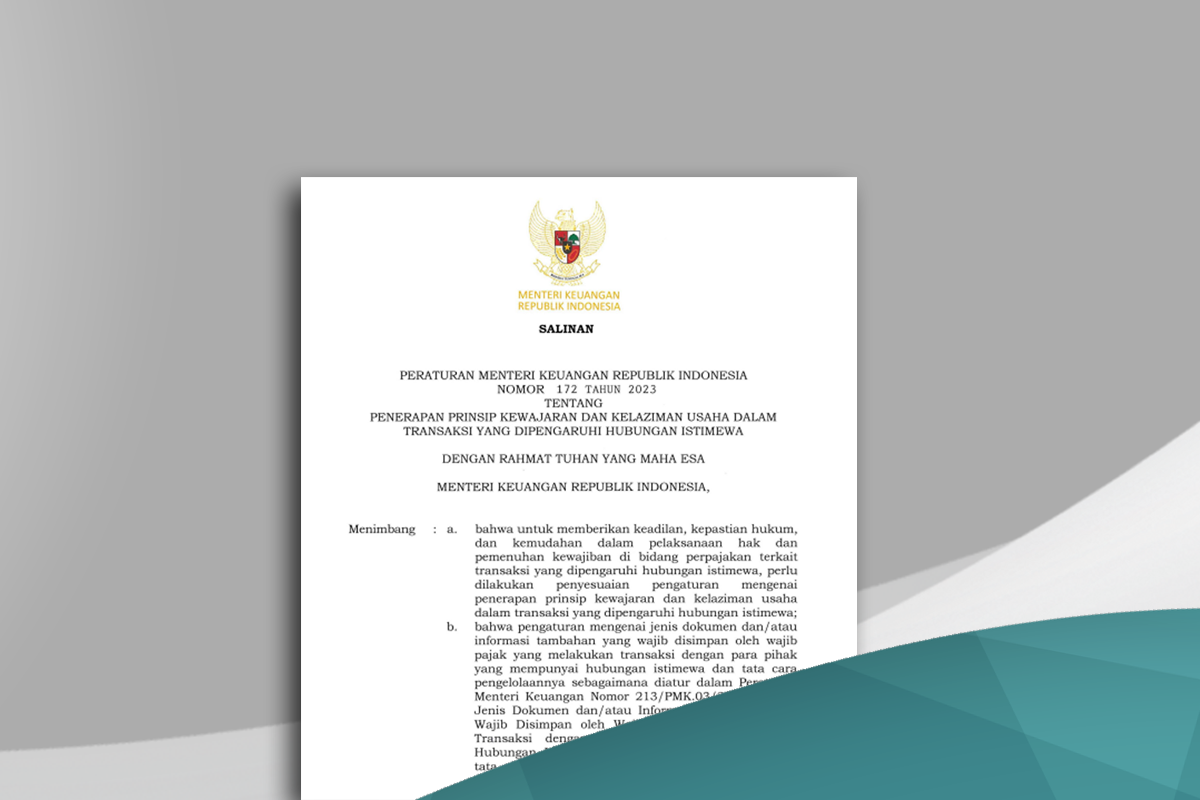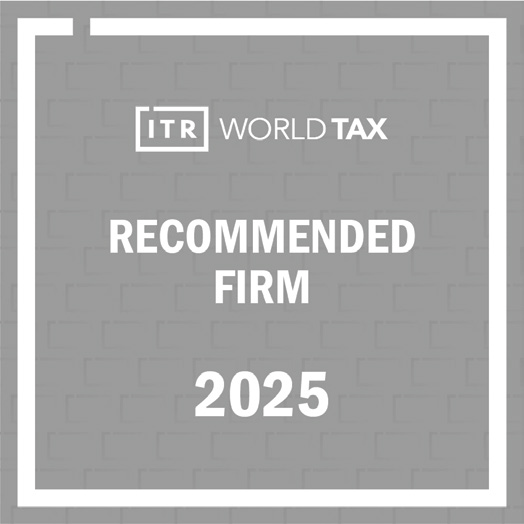PMK 172/2023: Secondary Adjustment of Transfer Price can be Cancelled
Tasya D. Salsabila, Tasya N. Mustofa dan Dewi Mita R.
|

Minister of Finance Regulation (PMK) Number 172 of 2023 (PMK 172/2023), released and effective on 29 December 2023, allows the tax authority to cancel the determination of secondary adjustment on transfer pricing correction.
This provision is an update made by the government. This is because this was not regulated in previous regulations such as Regulation of the Director General of Taxes Number 22 of 2013 (PER 22/2013), Circular Letter of the Director General of Taxes Number 50 of 2013 (SE 50/2013) and PMK Number 22 of 2020 (PMK 22/2020).
In this regulation, the Directorate General of Taxes (DGT) cannot cancel the secondary adjustment that has been determined, as a continuation of the primary adjustment on transfer pricing correction.
Conditions for Secondary Adjustment Cancellation
Secondary adjustment can be canceled by DGT if it meets two conditions as stipulated in Article 37 paragraph (4). First, the Taxpayer must agree with the primary adjustment made by the Tax Authority.
Second, the Taxpayer shall refund cash or cash equivalent according to the primary adjustment value. Under Article 37 paragraph (5), the addition and/or refund of cash or cash equivalent must be made before the Tax Assessment Letter (SKP) is issued by DGT. Thus, the Taxpayer needs to improve bookkeeping by making a reversing journal according to the primary adjustment value approved for repatriation.
Then, the counterparty Taxpayer may submit an adjustment in response to the primary adjustment made by the Tax Authority, which is called as corresponding adjustment.
Concepts and Definitions
Both primary adjustment and secondary adjustment are terms that arise concerning the audit practice of transfer pricing determination. Thus, in the transfer pricing audit, the Tax Authority may make corrections or adjustments to the difference between the price or profit of related party transactions and the fair price or profit.
The difference arising between the price or profit of the related party transaction and the fair price or profit due to the adjustment is called primary adjustment. Then, on the primary adjustment, it will continue with further corrections that can be made by the tax authority to produce a secondary adjustment.
Primary Adjustment
By definition and concept, the primary adjustment contained in PMK 172/2023 is no different from the previous provisions.
Thus, the primary adjustment arises or occurs due to the authority of the tax authority in testing or re-determining the amount of income or profit on the transaction, in accordance with the arm's length principle (PKKU).
The re-determination is carried out by comparing the income or profit of the related party transaction with the reasonable income or profit. If referring to Article 36 paragraph (5), adjustments will be made if it is known that:
a. Taxpayer does not apply PKKU;
b. The application of PKKU conducted by the Taxpayer is not in accordance with the provisions;
c. Taxpayers cannot prove the preliminary stage; or
d. The transfer price determined by the Taxpayer does not fulfill PKKU.
The redetermination of the amount of income and/or reduction is carried out by determining the transfer price under PKKU to calculate Taxable Income (PKP) and considering the stages of the Taxpayer's PKKU application that have fulfilled the provisions.
Read: Confirmation of Secondary Transfer Pricing Adjustment as Dividend
Secondary Adjustment
Apart from creating room for cancellation of its stipulation, there are no crucial changes related to secondary adjustment in PMK 172/2023. By definition and concept, the secondary adjustment contained in this new regulation is still the same as the previous regulation.
In line with previous provisions, such as PER 22/2013 and SE 50/2013. Then, it is regulated again in PMK 22/2020 and Government Regulation Number 55 of 2022 (PP 55/2022), the difference arising from the primary adjustment is still treated as an indirect distribution of profit to related entities, so it is treated as dividends (constructive dividends) subject to Income Tax.
In addition to reinforcing the definition of secondary adjustment, PMK 172/2023 also explains when dividends arising from secondary adjustment are subject to Income Tax, i.e. when income is paid, income is provided for, or income payment is due, depending on the event that occurs first.
Read: Secondary Adjustment, New Uncertainty, and Double Taxation Potential
Flexibility of Corresponding Adjustment
In addition to rearranging the primary adjustment and secondary adjustment, PMK 172/2023 also clarifies and rearranges the provisions related to the corresponding adjustment.
The regulation regarding the corresponding adjustment contained in PMK 172/2023 is now more flexible than the previous regulation. In particular, related to the corresponding adjustment process carried out through the Mutual Agreement Procedure (MAP).
For information, the corresponding adjustment is an adjustment made to the primary adjustment through an audit or to the correction of transfer pricing by the tax authorities of the partner country of the Double Taxation Avoidance Agreement (P3B). The goal is to adjust the amount of PKP.
The adjustment of PKP can be submitted by a Domestic Taxpayer whose counterparty is a Domestic Taxpayer subject to correction or a Foreign Tax Subject subject which is subject to correction by the tax authority of a P3B partner.
As for the corresponding adjustments with overseas counterparties, they can only be submitted through the MAP. The process can be submitted simultaneously with the application for the lawsuit, objection, appeal, reduction or cancellation of incorrect SKP, or judicial review.
At this stage, the government provides flexibility for taxpayers to file the corresponding adjustment along with other legal efforts, without the requirement to include transfer pricing adjustment points in the objection, appeal, or judicial review application. Thus, Taxpayers can choose to include the transfer pricing adjustment points in the MAP only.
This is different from the previous provision, in which the Taxpayer must include the transfer pricing adjustment points in both the application documents of the ongoing legal efforts and the MAP application.
Read: Corresponding Adjustment, Anti Double Taxation that the Authority Ignored
Domestic Corresponding Adjustment
In addition to being filed with a counterparty in a P3B partner country, corresponding adjustments can also be made with a counterparty located in Indonesia (domestic). The condition is that the counterparty Domestic Taxpayer agrees to the SKP and does not file a legal appeal against the SKP.
If the Domestic Taxpayer to whom the adjustment is made has fulfilled the two conditions aforementioned, the counterparty Domestic Taxpayer may apply for the corresponding adjustment with three mechanisms.
First, to amend the Annual Tax Return (SPT), as long as the Domestic Taxpayer has not been audited. However, before the Tax Return correction and SKP issuance, the counterparty Domestic Taxpayer must first send a written notification related to the transfer pricing information to the DGT.
Second, SKP issuance is conducted by considering the primary SKP of the counterparty Domestic Taxpayer if the Domestic Taxpayer is under audit. The SKP issuance is conducted in the event that there is a tax return correction accompanied by a written notification by the taxpayer to the DGT or the taxpayer submits a disclosure of untruth in the annual tax return to the DGT.
Third, through the mechanism of SKP correction in the office, by considering the transfer pricing determination by DGT. This is done as long as the Resident Taxpayer has been issued SKP and does not file a legal appeal on the corresponding adjustment material.
The three mechanisms are submitted by referring to the provisions in the Law on General Provisions and Tax Procedures (KUP Law).
Implementation and Challenges
In its implementation in Indonesia, there are still several issues related to adjustments that can be made by the tax authorities in Indonesia. Related to primary adjustment, the basis used by the Tax Authority is often different from the taxpayer's point of view. For example, the rejection or selection of comparability data that is not in accordance with the taxpayer's business characteristics. For the primary adjustment, a secondary adjustment is made which provides confusion on the definition of dividend according to Article 4 paragraph (1) of the Income Tax Law.
In the OECD TP Guidelines, secondary adjustment is not only limited to constructive dividends but can also be treated as constructive equity contributions and constructive loans. Indeed, the concept of constructive dividends in Indonesia does not contradict the OECD provisions. However, if constructive dividends are determined, even though it is not a transaction with shareholders, it will cause confusion over the definition of dividend itself.
Furthermore, regarding the corresponding adjustment, until now it has never been carried out by the tax authorities in Indonesia even though it was stated in the previous regulation. If the problem is that so far it is only stated in the technical regulation, hopefully, by regulating it at a higher level of regulation, taxpayers will have a strong basis to submit corresponding adjustments to DGT.
The complexity in the application of the corresponding adjustment seems to be a concern if there are differences in corrections between the two tax authorities, there will be a long administrative burden. In addition, there needs to be further technical provisions related to the administrative requirements needed both in filing a corresponding adjustment and canceling a secondary adjustment. (ASP/KEN)


